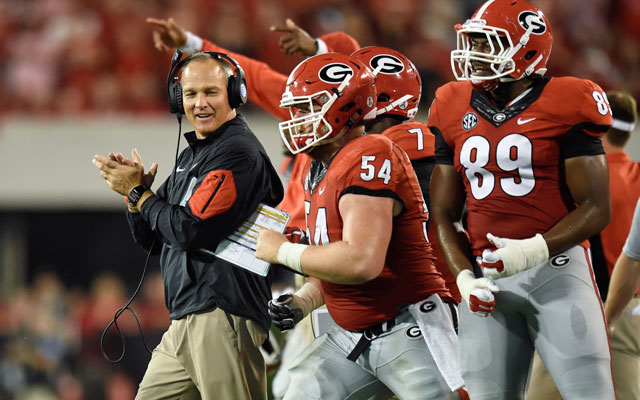ATHENS, Ga. -- Even Mark Richt’s brother-in-law has been curious about the ambition of Georgia's coach. Standing in a kitchen about five years ago, Kevin “Chappy” Hynes asked a form of the question that, fairly or unfairly, Richt becomes associated with year after year.
If you never win a national championship, Hynes asked Richt, will you feel like a failure?
“He sat there for a minute and mulled it over,” recalled Hynes, a Georgia team chaplain. “The Bible says in James 1:19, ‘My beloved brother, everyone should be quick to listen, slow to speak and slow to become angry.’ He’s the epitome of that. Finally, he said, ‘No. Do I want to win one? Bad, Chap, very bad. Am I going to feel like a failure? Absolutely not, because that’s not what defines me as a person.’ I’m like, ‘Praised God, let’s go win one!’”
It’s that time again: The armchair psychoanalysis of whether Mark Richt can win a national title, a crown that has eluded Georgia for 35 years.
Richt has the highest winning percentage in Georgia history and two SEC titles. But his last SEC crown came in 2005, and he has no national championships -- victories or appearances -- in a conference now defined by them.
| Best Programs Without a National Title (since 2001) | ||
| Team | Win Pct. | Coaches |
| Boise State | .856 | Dan Hawkins, Chris Petersen, Brian Harsin |
| Oklahoma | .795 | Bob Stoops* |
| TCU | .756 | Gary Patterson |
| Oregon | .751 | Mike Bellotti, Chip Kelly, Mark Helfrich |
| Georgia | .744 | Mark Richt |
| * Won national title in 2000 | ||
He wins an absurdly high 74 percent of his games, but he only comes out on top in 43 percent of his games against top-15 opponents.
He gets widely praised for handling discipline the “Georgia Way” and for his compassion. (Richt called on fans this week to help pay medical expenses for a Southern University player badly injured against Georgia.) But Richt was told by a Georgia fan on his radio show last November that he’s too nice, as if virtue and victories are somehow inherently connected.
Alabama, the alpha dog of the cutthroat SEC for much of the past decade, comes to town Saturday as an underdog for the first time since 2009. The meeting offers the latest opportunity for Lucy to yank the ball away from Charlie Brown with a disappointing Georgia loss. Or, it could offer the strongest evidence yet that Richt’s new coaching staff may pay off in a big way through the Sabanization of Georgia football.
A wave of new Georgia staff members -- six with Alabama ties, led by defensive coordinator Jeremy Pruitt -- have reenergized Richt’s program. You don’t survive in the SEC for 15 years, as Richt has, without adapting. This evolution may be the most intriguing.
Seven of Richt’s nine on-field assistants were hired in the past two years, a remarkable amount of change in one period. There’s offensive coordinator Brian Schottenheimer, who joined the Bulldogs from the NFL. Pruitt left Florida State for Georgia but spent most of his college career working under Nick Saban.
Running backs coach Thomas Brown came from Wisconsin. Inside linebackers coach Mike Ekeler arrived from USC via Indiana and Nebraska. Defensive line coach Tracy Rocker got hired from the NFL after several stints around the SEC. Offensive line coach Rob Sale and Sam linebackers/Star coach Kevin Sherrer also once worked at Alabama.
New strength and conditioning director Mark Hocke spent six years with the Crimson Tide; he has taken a page out of the playbook of his mentor, Alabama’s Scott Cochran, with high-energy, team-building workouts. Georgia beefed up its support staff and even the special teams quality control coach and director of player personnel once experienced the Saban process.
| Georgia coaches with Alabama ties |
| Jeremy Pruitt, Defensive Coordinator |
| Hired at Georgia in 2014. Served as Alabama director of player development and defensive back coach from 2007-12. |
| Rob Sale, Offensive Line Coach |
| Hired at Georgia in 2015. Served as Alabama strength and conditioning assistant coach and offensive analyst from 2007-11. |
| Kevin Sherrer, Sam Linebackers/Star Coach |
| Hired at Georgia in 2014. Served as Alabama director of player development from 2010-12. |
| Mark Hocke, Strength & Conditioning Director |
| Hired at Georgia for 2015 season. Served as Alabama co-associate strength and conditioning coach from 2009-14. |
| Sam Petitto, Director of Player Personnel |
| Hired at Georgia in 2014. Served as an Alabama defensive intern in 2008. |
| Carter Blount, Special Teams Quality Control Coordinator |
| Hired at Georgia in 2015. Served as an Alabama student assistant from 2008-09. |
Saban offered the Bulldogs as high a compliment as there is this week by saying they look a lot like his past Alabama teams -- physical, aggressive and mistake-free. “That’s the kind of team we kind of always sort of aspired to have here,” Saban said, “and it certainly looks like that’s the kind of team they have developed there.”
If Richt is ever going to win his elusive national title -- he says if they keep working like they’re working, “I think it will come” -- he will do so with new blood and a willingness to embrace different ideas.
“That’s how you do it, just plug away and be flexible,” former Florida State coach Bobby Bowden said. “We were in the top four five years before we ever won a national championship. It’s like putting in golf, and you put it and it lips out. One of these days, it’s gonna fall. That’s about the way I have Georgia pegged.”
Now 55 years old, Richt appreciates how Bowden listened to some of his ideas at Florida State. When Richt was Bowden's quarterback coach, Florida State adopted a fast-break, no-huddle offense with Charlie Ward that won Bowden his first national championship after years of coming close.
“If he wasn’t open minded, there’s no way we would have been doing what we ended up doing and playing the game a little bit different than he was used to doing it,” Richt said. “He allowed us as a staff to do some new things. He listened and we proved to him as a staff it was going to be a positive thing.”
Mark Richt is listening.
‘I saw a different Mark Richt’
When we last saw Alabama vs. Georgia, the clock ran out on the Bulldogs’ national title hopes at the 2012 SEC Championship Game. Instead of Georgia spiking the ball to stop the clock, Aaron Murray threw a pass intended for wide receiver Malcolm Mitchell into the end zone, but Alabama linebacker C.J. Mosley got a finger on the ball. It fluttered toward Georgia receiver Chris Conley, who instinctively caught the ball at the 5-yard line. Time expired.
“It felt like a missed opportunity we could have celebrated as a team because of mistakes we made that week or during the game,” said Mitchell, one of the few Georgia players who remain from the 2012 team.
If it had won that game, Georgia -- not Alabama -- could have been the team demolishing Notre Dame for the BCS National Championship. History might have been rewritten. Richt could have captured his national title, and Saban wouldn’t have had his back-to-back championships.
Somewhat lost in the drama of the final play was how Alabama controlled the game physically from late in the third quarter through the fourth. Rush Propst, who coaches Georgia 6A state champion Colquitt County High School, remembers how overmatched the Bulldogs looked late in the second half. He attended several Bulldogs practices this spring and noticed a major difference in intensity and physicality.
“I saw a different Mark Richt than I’ve seen in the past four or five years -- more animated, more energy -- practice was a lot more intense,” Propst said. “There was a sense of urgency more so than I had seen in past years, even when they made it to the SEC Championship Game in 2012. They look like where Alabama was in 2008. I think they’re still a year away, but I think they’re right on the cusp of doing something big.”
The new coaching staff “has done a great job of making sure not only do we compete on Saturdays, but every day throughout practices,” Mitchell said. “And not just compete against opponent, but compete against teammates. That’s different. Practices are definitely more intense.”
Georgia senior linebacker Jordan Jenkins said offseason workouts were the most structured in his college career.
“We took a more professional outlook on things,” Jenkins said. “I feel like fans are really tired of us making it all the way to right before the top and then crashing and burning eventually like we have in the past. We’re tired of it as well. We want to push ourselves to make it there and win.”
Pruitt, a fanatical recruiter, often gets credited as the primary reason for new energy in Georgia’s program. Bulldogs athletic director Greg McGarity and Richt are quick to point out Pruitt’s ideas are just one person’s opinions and other assistants offer extensive ideas. When the entire staff buys into an idea, Richt said, that’s when you know it’s a good one and easier to sell.
But as Hynes said, “Jeremy Pruitt has been a very big catalyst in some of the changes that have happened at Georgia. You don’t have to be an investigative reporter to know that.”
Last November, Pruitt publicly said the 2014 Georgia team would be the last one without an indoor practice facility. It was an effort by Pruitt to let recruits know a facility is coming because he felt its absence gets used against the Bulldogs, which are located in a talent-rich state.
“The plans were already in the works,” Richt said. “It happened on a day when it rained and we weren’t able to get outside and work so I think he had some frustration that day.”
Last season was not Georgia's last one without an indoor facility. Georgia was forced to practice for Alabama outside in rain this week. Still, a message was sent. Pruitt will push the envelope at times, even if his comments may have ruffled some feathers within the administration.
“I think Jeremy Pruitt is wired in such a way that what happened is he came to Georgia, wants to be the best, saw some real needs and made them known,” Hynes said. “He has upped the ante.”
| All-Time Winningest Coaches in SEC Games | ||
| Coach | SEC Win Pct. | National Titles |
| Robert Neyland | .787 | 4 |
| Nick Saban | .775 | 4 |
| Frank Thomas | .765 | 2 |
| Bear Bryant | .764 | 6 |
| Urban Meyer | .750 | 3* |
| Phillip Fulmer | .731 | 1 |
| Steve Spurrier | .716 | 1 |
| Vince Dooley | .713 | 1 |
| John Vaught | .707 | 3 |
| Gene Stallings | .704 | 1 |
| Les Miles | .698 | 1 |
| Mark Richt | .689 | 0 |
| * Meyer's national titles: Florida (2), Ohio State (1) | ||
When Georgia’s $30 million indoor practice facility opens near the end of 2016, the school will be the last in the SEC to have built one. For a while, Richt hit some ceilings with university administrators who were set in “some old Georgia ways” regarding needs for the football program, Hynes admitted.
“Once (the new assistants) came here, it’s like, ‘We need this, we need that, and we came from programs that had this,’” Hynes said. “It gave Mark more wisdom, more understanding, more of a shot in the arm to say, ‘We need this.’ He ran into roadblocks, but this new staff said, ‘Let us help you push through these roadblocks.’”
When Pruitt was asked this week what qualities he tried to take from Alabama and bring to Georgia, his answer sounded like a carbon copy of Saban, right down to calling a college football program an “organization.”
“One thing that we’d like to do is create the standard and the expectations here and do it over and over and hold everybody accountable who don’t do it the way that we want them to do it,” Pruitt said. “I think that’s what you’ve got to do in any organization if you want to have success. You’ve got to define the roles for the individuals in the organization, and if they do it right, pat them on the pack, and if they don’t, you’ve got to correct them.”
New assistants boosting the program is only part of the story. The other part is a new administration. Jere Morehead, who declined to be interviewed for this article, replaced Michael Adams as Georgia president in 2013 and is viewed as more willing to provide increased resources.
Georgia increased its football spending by 33 percent this year, the Athens Banner-Herald reported. Richt received a contract extension through 2019 that bumped his salary up from $3.2 million to $4 million.
The Bulldogs’ assistants now make $4.5 million, up from $3.3 million in 2014, when their pay ranked 13th nationally and sixth in the SEC, according to USA Today’s coaching salary database. Last year, Georgia’s staff made $2.2 million less than LSU and $1.9 million less than Alabama.
Pruitt’s salary increased from $851,600 to $1.3 million, pushing him from the country’s 13th highest-paid assistant to seventh. Former Georgia offensive coordinator Mike Bobo, who became Colorado State’s head coach, made $578,700 in 2014 to rank 40th among all assistants nationally. Two SEC position coaches made more than Bobo. Schottenheimer, the Bulldogs’ new offensive coordinator, makes $950,000 and is believed to be in the top 10 nationally for assistant coaches.
McGarity, Georgia’s AD, said the university has always been committed to spend money to be competitive while trying not to operate in the red. Five additional football staffers were hired when resources were reassigned, providing more quality control coaches and support staff for athletes.
“I would say the level of detail has increased on the staff,” McGarity said. “We weren’t at that level probably because we did not have a model, so to speak. But I think since this new injection of adrenaline and a sort of tweaking of a system that Mark’s had in place for 25 years, he’s been able to do a phenomenal job of navigating through those recommendations while never compromising on his principles.”
Stricter discipline at Georgia
It’s no secret Georgia is often more strict in how it disciplines players than many other SEC programs. Some players dismissed by Richt through the years have ended up signing with rivals and performing extremely well. Quarterbacks Zach Mettenberger (LSU) and Nick Marshall (Auburn) come to mind.
Last offseason, Alabama signed defensive lineman Jonathan Taylor even though Georgia dismissed him after he was arrested for allegedly hitting and choking his girlfriend. Taylor was then later dismissed by Alabama when another woman accused him of assaulting her. He is now on the football team at Southeastern Louisiana and eligible to play in 2016.
Before Taylor enrolled at Alabama, Georgia officials sent photos of the first woman’s injuries to University of Alabama police and McGarity confirmed details found in the police report to Crimson Tide athletic director Bill Battle, ESPN’s Outside the Lines reported in September. Alabama said neither Saban nor Battle ever saw the photos and relevant information was provided to the university’s admissions committee. The Taylor situation resulted in a new SEC transfer rule that was proposed by Georgia.
“I don’t know (if Battle and Saban saw the photos),” McGarity said. “I just had a conversation with Bill about the police report, which was very descriptive. It was a very short conversation and that’s the extent of it. … ’Outside the Lines’ painted us as not having second chances, but there are a number of individuals who have second chances through our system.”
Arrests and suspensions had been the norm in Athens. For the first time in recent memory, Georgia saw no player arrests surface publicly in the offseason. Steve Spurrier’s old joke became outdated: He could no longer enjoy playing the Bulldogs early by banking on a couple key players sitting out with suspensions. Georgia routed South Carolina 52-20 in Week 3.
Richt said additional support staff to mentor players has helped reduce discipline problems. “I think sometimes you get lucky,” he said. “There are other places that have all that in place and guys still get in trouble. I’m not going to sit here and say it’s a fail-safe way of doing it.”
Sure enough, shortly after Richt’s comments this week, a report surfaced that Georgia wide receiver Isaiah McKenzie was being investigated by police for allegedly threatening a woman at a Chili’s restaurant by saying he was going to kill her. A day later, Athens police said the woman declined to press charges; the investigation is closed, meaning McKenzie will likely play Saturday.
Around the SEC, there have been questions for years about how frequently -- or rather, infrequently -- some schools drug test players and how many games those players miss for testing positive. Georgia has tried to get standardized SEC drug testing for years with no success.
Georgia athletes are suspended 10 percent of a season for the first failed drug test, 30 percent for the second and get dismissed for the third. In recent years, Alabama, Arkansas, Florida and LSU have had a policy in which a player gets dismissed after the fourth positive test.
“The first positive test often gets our players’ attention,” McGarity said. “We think our policy is the right thing to do and it sends a clear message that if you want to become part of our program, there are strict rules that shouldn’t surprise you.”
Richt said he does not get frustrated that he loses players to competitors due to stricter policies.
“My goal is to do what I think is right; my goal is to do what I think God would be in agreement with as well,” Richt said. “When I put my head on the pillow, I want to have some peace that I’m doing at least what I felt was the right thing to do in a certain situation.”
In recent years, Richt set up the Paul Oliver Network to match businessmen as mentors for ex-Georgia players so they can better try to lead a productive life after football. The network is in honor of Oliver, a former Georgia and NFL defensive back who killed himself at the age of 29 after his football career ended.

Richt wouldn’t touch the question this week on whether he’s too nice to win a national title. When a Georgia fan last November raised that concern, Richt sarcastically shot back, "I bet you coached a lot of games in your day, so I bet you have it all figured it out."
There are other dimensions to Richt. Painting anyone into a black or white box can be a dangerous exercise, especially an SEC coach. Hynes said he won’t play basketball or cards with Richt because the coach is too competitive and badly wants to win.
“I don’t think 'nice' has anything to do with whether he can win a national title,” Hynes said. “It’s X's and O's and Jimmys and Joes. … The academics at Georgia, the urine (drug) tests at Georgia, the facilities at Georgia -- I don’t know if we’ve ever been given as good a chance as others. I ain’t crying in my Wheaties, but when you look at the totality of what (Richt) has been through, bro, that guy is a winner.”
SEC schools have hired 30 coaches since Richt took over Georgia in 2001. Richt ranks 12th all-time in winning percentage in SEC games; the other 11 coaches all have won a national title.
Bowden said Richt’s ability to survive in the SEC speaks to a competitive streak often not associated with his mild-mannered demeanor.
“I think you’re a coach and you’re a Christian and one doesn’t mean anything about the other,” Bowden said. “I think (critics) use his Christian faith as a reason and maybe they need to find (religion) themselves.”
It’s hard not to think of Bowden and former Nebraska coach Tom Osborne when discussing Richt’s pursuit of a national championship. Osborne averaged 10 wins a season for his first 21 years without winning a national title. He once told the story that he spoke at a prison and even the inmates asked when he’s going to win the big one.
The latest “big one” approaches Saturday for Richt, who knows how Osborne’s story ended.
“He won three (national titles) out of four to end his career,” Richt said, smiling. “You never know, do you?”
Follow and read more from Jon Solomon on Facebook and Twitter.




















